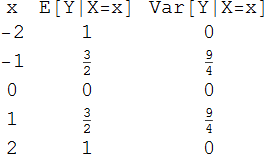I have this task with two questions I would like to compute in Mathematica.
Suppose a pair of random variables $(X, Y)$ has a equal distribution on the following 7 points:
$\begin{matrix} & x & y\\ 1 & -1 & 0\\ 2 & 0 & 0\\ 3 & 1 & 0\\ 4 & -2& 1\\ 5 & 2 & 1\\ 6 & -1 & 3\\ 7 & 1 & 3 \end{matrix}$
The simultaneously probability function $p(x, y)$ is then given by: $p (1,0) = \ldots = P (1, 3) = 1/7 \text{ and } p(x, y) = 0$ for all other points
1) Find the conditional mean $E (Y\; |\; X = x)$ and the conditional variance $V (Y\; | \;X = x)$ for $x = -2, -1,0,1,2.$
2) Compute the variance on Y and the variance on the conditional mean of Y given X
This additional information might help you:
E(X)=0
E(Y)=8/7
I have tried over and over but without any luck.
Ps. I use Mathematica 8.

